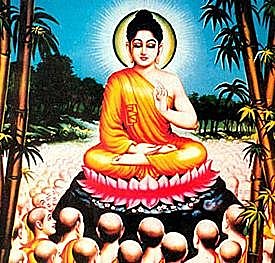
護僧的基本認知(二)
開仁法師著
一丶觀德莫觀失
佛法的修學,非常重視親近善知識,佛曾喻說親近善士是滿梵行,由此可知修道是不能沒有善知識為指引的。雖然說善知識不分在家出家,但是在佛教領域中,出家由於將身心奉獻給三寶,自然能取得領導佛教的地位。相對的,其負荷之責任亦一樣的重大,所要面對的壓力更是來自各方面,倘若再加上自己設定的修行要求,實不是一般人所能負擔得起的。也就是因為這樣,舍俗出家,真可說是大丈夫啊!
既然出家人有如斯之功德,那身為在家眾應如何親近丶觀察他呢?傳統都會說:觀德莫觀失。是否真的只要觀察其功德就好了呢?以現實來說,除非盲目的信仰與崇拜,否則,出家眾的過失和不足,是不難發現的。雖然如此,站在從表像維持僧團的清淨面來看,筆者以為:知道出家眾的不足之處是免不了的,只是知道而不到處宣傳,除非破了根本大戒(若有健全僧團,也應由僧團給予解決,在家眾不應追問),那為了僧團的清白,才不得不通知大眾,提高警惕,以免讓此人消遙法外。
身為居家者,除了有維護出家眾之和樂清淨外,更應該站在全體佛教的立場,如法地協助僧眾推廣佛法,使正信正見能普及人間。觀德莫觀失,不是加深對僧團的腐敗而不理會,反而是從旁幫助有過失者得以恢復清淨身。這其中除了要有雅量接受出家眾有改過的機會外,更須和僧團建立如法的溝通橋樑,以免自己犯上誹謗的過失而不自知。
The Fundamental Knowledge in Safeguarding the Sangha Members(二)
By Ven Kai Ren
1. Observe Merits Not Shortcomings
In practicing the Dharma, getting to know and learning from Kalyana mitra is very important. It is impossible to practice the Dharma without the guidance from Kalyana mitra. Although Kalyana mitra can be a lay person or a monk / nun, from the perspective of Buddhism, since monastics dedicated themselves to the Triple Gems, naturally they assume a leadership role in Buddhism. Relatively speaking, their responsibilities are also heavier and have to face pressures from various quarters. Coupled with their own Dharma practice and commitments, their responsibilities are heavy indeed and cannot be shouldered by ordinary people. For this reason, joining the monastic life requires great determination.
Becoming a monk / nun has immense merit, how do lay persons get to know and observe him / her? Traditionally, we used to say “observe merits not shortcomings”. Is it really sufficient that we observe their merits? Unless we blindly believe or worship, it is not difficult to discover shortcomings of monastics. Nevertheless, I am of the view that in order to maintain the good reputation of the Sangha, unless there is a fundamental infringement, then only lay persons should pursue and inform members of the public so that they become alert and the wrongdoer will not go scot-free. If there is a proper Sangha system, wrongdoing by members of the Sangha should be dealt with by the Sangha and lay persons should not interfere.
As lay persons, apart from protecting the peace and harmony of the Sangha, we should look at things from the perspective of the whole Buddhist community, assist the Sangha to propagate the Dharma as widely as possible in this world. “Observe merits not shortcomings” does not imply we just ignore the degeneration of the Sangha, on the contrary, it means we should help to restore the purity of wrongdoers. We should be magnanimous to allow members of the Sangha who have done wrong to repent and turn a new leaf. We should also build a communication bridge with the Sangha so that we ourselves will not unknowingly make the mistake of slandering the Sangha.
沒有留言:
張貼留言